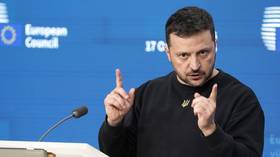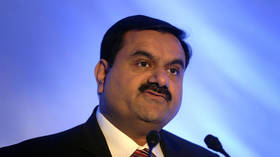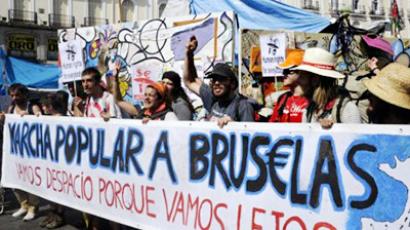Merkel and Sarkozy propose euro-zone “government” to tackle debt crisis
Germany and France are calling on all euro-zone members to enshrine a balanced budget in their constitution, as well proposing a collective “government” led by the EU president.
In one of the most dramatic expansions of state power since the onset of the EU debt crisis, France and Germany have proposed a united euro-zone government to guide the bloc’s finances as well as having power to overrule national governments. The new collective economic 'government' would be lead by Herman Van Rompuy and consist of heads of state or government that would meet at least twice a year.“We want to express our absolute will to defend the euro and assume Germany and France’s particular responsibilities in Europe and to have on all of these subjects a complete unity of views,” said Sarkozy. The Franco-German tandem, who represent the euro zone's two largest economies, have also proposed to unite the corporation taxes of two countries.A tax on financial transactions have also been announced. According to Angela Merkel this is being done in order to harmonize economies and taxes across Europe. Nicholas Sarkozy faces an election next year, where he is already trailing behind his rivals, and many suspect that those announcements might make him even more unpopular in his country. Opinion polls show that people in Europe do not want closer integration.Merkel and Sarkozy have dismissed the use of Eurobonds, which many have said would be the solution to Eurozone’s economic problems.They have said that Eurobonds are “not a solution, they are not a cure” and France and Germany will not guarantee other country’s debt, they refuse to bail out the rising problems in countries like Italy and Spain. Meanwhile, influential investors like George Soros are supporting the Eurobonds, saying the only solution for such weak countries as Portugal and Greece is to leave the euro.The problem is that Germany has already been sucked into the crisis itself with its economic growth skidding to a halt in the second three months of the year. It's economy grew by just 0.1 per cent in the second quarter, while the French economy stagnated.
Finance professor Marco Becht from the Solvay Brussels School says that none of the proposals made today by Angela Merkel and Nikolas Sarkozy will have a positive impact on the euro-zone crisis.“We were not surprised by anything that was said,” he said. “What markets are looking for is the actual implementation of the decisions that were taken in July, which is mostly loading up the European financial stability mechanism with money, so it can become operational and purchase bonds in the secondary markets.”
Meanwhile, the chief economist at Natixis Asset Management, Philippe Waechter, says that if the proposed euro-zone “government” is indeed created, Europe’s leading economy will have to make serious concessions. “Germany will not be the chief,” he stated. “We will have to share all things, because we will succeed only if we all go together in the same direction.”
And Scheherazade Rehman, a professor of business and international affairs at George Washington University, says the decisions taken at the meeting reflect only the political aspirations of German and French leaders, and not market demands. “Unfortunately, this is not going to make much difference for the ongoing crisis,” she told RT. “All the news that came out from this news conference is quite negative for the market. The most negative was the fact that it was announced that the European fund for stabilization facility – the bailout fund for the euro-zone members – will not be expanded. The second thing: there is no common Eurobond that was going to be issued, and they were very clear about it and the markets were not expecting this. Other bad news for the market was that taxation is going to go up.”“So, the European leaders have done it again – they have not really addressed the market’s needs for clear concise action, but what they are doing instead is looking at the long-term political solution to the dilemma that they have,” concluded Rehman.
Financial writer Peter Bild argues that economically and politically, what the two leaders have done is basically the right thing, or at least a step in the right direction. “There is no quick fix,” he told RT. “The only quick fix is the one that the Central Bank or the stability fund that’s been set up in the euro-zone can possibly handle. In other words, they can manipulate the market, but the essential problem is not the question of market manipulation. It is fundamentally the question of the huge debts that are being run up, in some cases not even willfully but in response to a huge economic downturn, which means that countries’ revenues have fallen and, as things stand right now, I can’t see any end to it. We are seeing that all of Europe is slowing down, and that means that probably deficits will increase and not decrease.” “In the end, if you are hugely in debt, it is your creditor who tells you what you can and what you can’t do,” Bild stated. “Parliaments may not like it, but in the end, if the budgets are not harmonized, if they are not done in accordance with rules which limit how much debt you can run up, then of course the creditors are simply not going to give you any money. Now, if you accept that you do need money, then you are also going to have to accept the rules and possibly the loss of some so-called sovereignty.”














